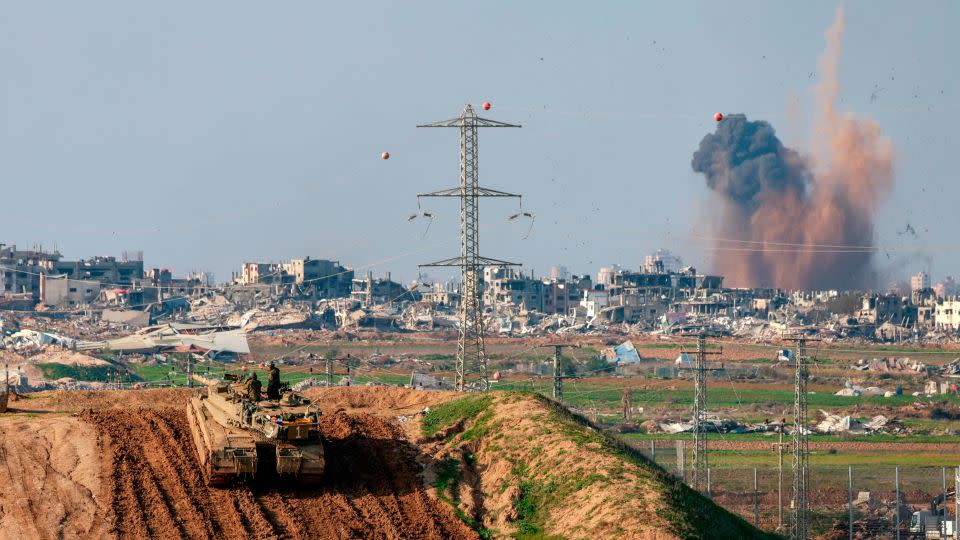Israel and Hamas have agreed deal on medicine for hostages, aid to Gaza, Qatar says
Qatar says it has brokered a deal between Israel and Hamas that will see medicines delivered to Israeli hostages in Gaza in exchange for the delivery of medicine and humanitarian aid to Palestinian civilians.
“Medicine along with other humanitarian aid is to be delivered to civilians in the Gaza Strip, in the most affected and vulnerable areas, in exchange for delivering medication needed for Israeli captives in Gaza,” the Qatari Ministry of Foreign Affairs said Tuesday in a statement posted on X.
The medications and aid will leave Doha on Wednesday and head to Egypt before being transported to Gaza, the ministry added. It is unclear when the medicines are expected to reach Gaza.
Osama Hamdan, a Lebanon-based Hamas official, said the agreement was dependent on there being enough medication for Palestinians in Gaza in addition to the Israeli hostages.
“Any initiative to allow medicines delivery to the detainees (in Gaza) should include medicine delivery to Palestinians in Gaza,” Hamdan said during a press conference in Beirut on Wednesday.
Hamas has stipulated that for every one box of medication provided for the hostages, 1,000 boxes of medication be provided for Palestinian civilians in the enclave.
“For every box of medicine, a thousand for our people, we were the ones who asked our brothers in Qatar to provide medicine because of our trust in them, and she gratefully agreed,” Dr. Mousa Abu Marzouq, a senior member of Hamas, wrote Wednesday on X.
The development follows calls by the relatives of the more than 100 remaining hostages believed to be alive in Gaza for medications to be passed on to their loved ones.
It has been more than three months since Hamas fighters attacked Israel on October 7, killing 1,200 people and taking more than 240 hostage. The Hostages and Missing Families Forum, an advocacy group for the victims’ families, say that each new day in captivity further endangers their lives and health.

At least a third of the hostages have chronic illnesses and require medications, the forum said in a report released last week, adding that “others suffer from illnesses related to the harsh captivity conditions, which include mental and physical torture.”
Asked whether the medicine deal could lead to a broader package of support for hostages, David Harden, former USAID mission director in the West Bank and Gaza, was not optimistic.
“Look where we are right now. More than 100 days in, we’re just getting medicine to hostages and medicine into hospitals. It’s really a deep hole that we’re trying to walk out of,” Harden told CNN. “Yes, it’s a good thing, though, to have medicine for innocent people. Whether or not it leads to anything further, it’s very hard to tell.”
Since the end of a week-long truce in November, Israel has stepped up its military operations in the besieged enclave. The Hamas-run Ministry of Health in Gaza said Tuesday that since the war began, 24,285 Palestinians have been killed. Among the dead are 10,600 children, it said.
Severe shortages of medicines and medical supplies in Gaza have led to operations being performed on children without anesthesia, according to UNICEF and a British surgeon who led an emergency medical team at the Al-Aqsa Hospital in central Gaza.
Key broker
The Qatari announcement comes days after the Israeli Prime Minister’s Office said the director of Israel’s Mossad spy agency, David Barnea, had reached an agreement with Qatar on the delivery of medicines to hostages held by Hamas in Gaza.
Qatar played a key role in brokering an agreement between Hamas and Israel that led to the brief truce in November and the release of more than 100 hostages, as well as hundreds of Palestinian prisoners held by Israel.
The International Committee of the Red Cross (ICRC), which helped facilitate the release of the hostages in November, has been unable to visit the remaining captives in Gaza and does not know where they are, it told CNN.
It is unclear if the Red Cross will help pass the medication to the hostages. Over the weekend, an official familiar with the discussions told CNN that the Red Cross would not have a role in the deliveries.
The medicine is destined for more than 40 hostages thought by Israel to need it, according to the official.
Throughout the war, Israel has allowed a limited amount of aid and medicines to enter Gaza but far more is needed, humanitarian groups say. The United Nations has complained that Israel has been rejecting missions to deliver supplies to northern Gaza.
An estimated 1.9 million people, or 85% of Gaza’s population, are now internally displaced, says the UN, while only 15 of the enclave’s hospitals remain operational.
CNN’s Alex Marquardt, Christian Edwards, Ibrahim Hazboun and Eyad Kourdi contributed to this report.
For more CNN news and newsletters create an account at CNN.com


